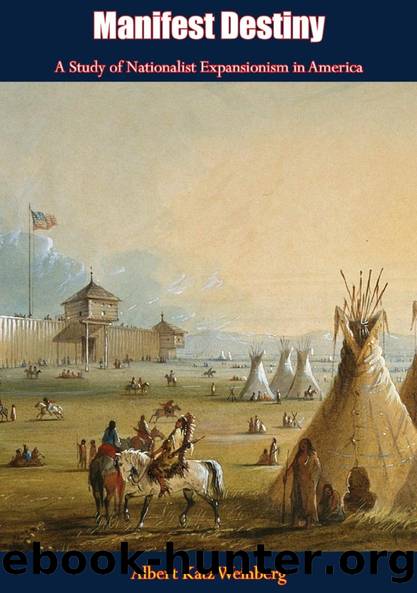Manifest Destiny by Albert Katz Weinberg

Author:Albert Katz Weinberg [Weinberg, Albert Katz]
Language: eng
Format: epub
ISBN: 9781422717301
Google: ojFHLwEACAAJ
Publisher: Reprint Services Corporation
Published: 2012-02-15T03:36:07+00:00
CHAPTER XâTHE WHITE MANâS BURDEN
The expansionistâs belief that a tide of fortune was carrying the nation out to âsea powerâ had scarcely seemed confirmed by Hawaiian annexation when it was suddenly shattered. Disillusionment came when a soi-disant Philippine government met the threatened submersion of its pretension to national independence with unexpected resistance. Shortly after the outbreak of the Philippine insurrection, the anti-imperialistic Bryan could say with malicious humor: ââDestinyâ is not as manifest as it was a few weeks ago.â{1151} What had become painfully manifest was that the fulfilment of expansionist desires could no longer be left to fate but required forceâconceived by John Morley as an inevitability of imperialism.
In resorting to imperialist subjugation the expansionists pursued a course which had previously been considered alien to Americaâs humanitarian destiny. To be sure, the principle of consent of the governed had been violated in letter so often that imperialism should have seemed as traditional as philosophical democracy. But such generalizations of nations are formulated with a view not to strict obedience but only to keeping disobedience within reasonable limits. In truth, the principle of consent had never been conspicuously violated by national action to a degree which was in patent conflict with its humanitarian spirit. While it had generally appeared over-scrupulous to obtain the registered consent of the governed, it had rarely seemed consistent with the spirit of democracy to override a refusal so sharp and widespread as to require conquest. Until 1899, the year of militaristic imperialism, the American could plausibly repeat the words of Jefferson: âConquest [is] not in our principles...â{1152}
However, anti-imperialists shocked at human casualties were wrong in interpreting the conquest of the Philippines as an overriding of principles by mere sadistic ambition. In the complex affairs of state the shedding of blood usually signifies not sadism but merely the fact that, as Bossuet has said, men do otherwise than they intend. Actually, the president called by one anti-expansionist an âinsatiable murdererâ{1153} was one of the most amiable and honorable of men. Even his less amiable supporters were doubtless all honorable men, possessed of that deep-seated conviction of their intention to do right in which Assistant Secretary of State Hill saw the greatness of the American people.{1154} A paradoxical fact is, indeed, that the same humanitarian ideal which had once been used to discredit conquest was now employed with equal confidence in its justification.
The central doctrine of imperialism went far beyond Montesquieuâs truism that conquest can benefit the conquered. It also benefited the self-esteem of the conqueror by attributing to him a lofty motive which aggressive peoples had not usually claimed before the racially and culturally self-conscious imperialism of the nineteenth century. Like European predecessors in this century, American expansionists conceived force in its various degrees as the means of fulfilling the destined duty of extending civilization to the unappreciative race of color.
As curious as certain marriages of human opposites, this ideological association of humanitarianism and force suggests either of two diverse possibilities as fundamental cause. One possibility
Download
This site does not store any files on its server. We only index and link to content provided by other sites. Please contact the content providers to delete copyright contents if any and email us, we'll remove relevant links or contents immediately.
In Cold Blood by Truman Capote(3374)
The Innovators: How a Group of Hackers, Geniuses, and Geeks Created the Digital Revolution by Walter Isaacson(3123)
Steve Jobs by Walter Isaacson(2885)
All the President's Men by Carl Bernstein & Bob Woodward(2361)
Lonely Planet New York City by Lonely Planet(2207)
And the Band Played On by Randy Shilts(2183)
The Room Where It Happened by John Bolton;(2144)
The Poisoner's Handbook by Deborah Blum(2126)
The Innovators by Walter Isaacson(2096)
The Murder of Marilyn Monroe by Jay Margolis(2089)
Lincoln by David Herbert Donald(1979)
A Colony in a Nation by Chris Hayes(1920)
Being George Washington by Beck Glenn(1883)
Under the Banner of Heaven: A Story of Violent Faith by Jon Krakauer(1787)
Amelia Earhart by Doris L. Rich(1684)
The Unsettlers by Mark Sundeen(1681)
Dirt by Bill Buford(1665)
Birdmen by Lawrence Goldstone(1658)
Zeitoun by Dave Eggers(1636)
